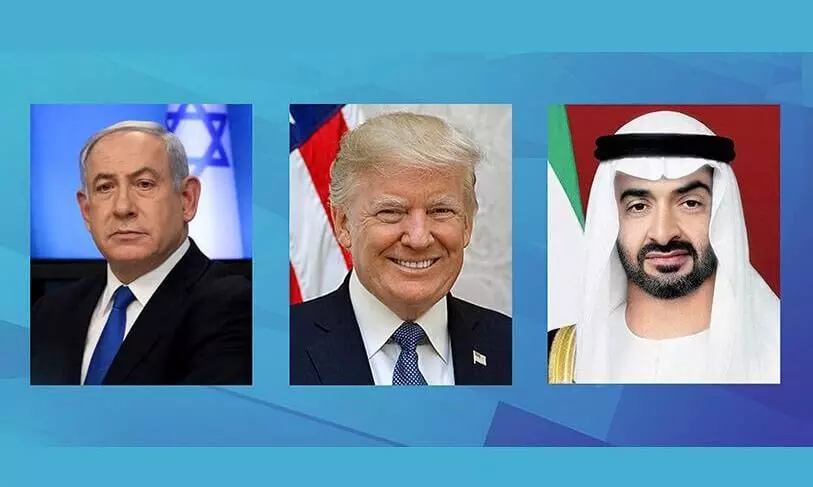
UAE-Israel Peace Deal
text_fieldsNetanyahu, Trump and Sheikh Mohammed bin Zayed (file photos)
The peace deal signed between United Arab Emirates (UAE) and Israel, after several rounds of negotiations under the aegis of US president Donald Trump, is mainly about UAE recognising and establishing full diplomatic relations with, Israel in addition to co-operation between the two countries in sectors of security, investment, technology, energy, health, environment, culture and tourism. Following the issue of a joint declaration about the deal, there have been mixed responses across the globe in general and in West Asia in particular. Naturally, when America and Israel hail the tripartite agreement as a huge win, Palestinian groups uniformly oppose it. Hamas has called it a stab in the back, while the Palestinian Authority headed by Mahmoud Abbas has said that the deal amounts a betrayal of Jerusalem, Al-Aqsa and the Palestinian cause.
The deal contains a provision that further Jewish settlements in east Jerusalem, densely populated by Palestinians, declared by Israeli prime minister Benjamin Netanyahu, will be suspended, which fails to meet Palestinian demands. The main reason is that the wording 'will suspend' does not even indicate that occupation will be abolished. Further, it also amounts to a rejection of the theory of two-states in Palestinian land - which the US itself had proposed earlier. The solution of the US was a formula recognising the land occupied by Palestinians and Gaza as an autonomous region without its own military. The 2002 peace plan proposed by Arab League including the UAE, had also stressed on this proposal. Hence the response of Palestinian groups that the current proposal which is silent on that concept is unacceptable. Even Jordan, which has expressed optimism that the deal would help taking forward the stalled peace talks, made it conditional on the principle that it should lead to establishment of a Palestinian state in the area annexed by Israel in the 1967 Six-day Arab-Israel war. And Jordan is one among the three Arab countries that had recognised Israel already.
One of the first countries to hail the US-Israel-UAE declaration was Egypt under president Abdul Fatah Al-Sisi, the first country to have recognised Israel through the Camp David peace treaty in 1978. Sister Gulf country Oman also has backed UAE. Iran and Turkey are in the forefront of Muslim countries to openly, and staunchly, criticise the new treaty. The Turkish foreign ministry commented that " history and the collective conscience of people in the Middle East will not forget and never forgive the 'hypocritical behaviour' of the UAE in agreeing to normalise ties with Israel." European nations including Germany, Britain, France and Spain welcome the US-led agreement. In the US, Trump's rival and Democratic presidential candidate Joe Biden has welcomed UAE's decision to openly recognise Israel, calling it a historic step and " a welcome, brave, and badly-needed act of statesmanship". While saying this, he also reiterated his opposition to Israel's annexation of territories and vowed that he and his running mate Senator Kamala Harris would work to expand efforts to keep the Middle East region in peace.
In a nutshell, the world's response to the Middle East conundrum , which has been burning in the Middle East as powder keg in store for the last three quarters of a century and has led to several wars, is that it should be solved peacefully. And for achieving lasting peace in the region, the generally held view is that it can be done only through mutual understanding between Israel and Arabs with an attitude of give and take. But in spite of peace talks that were held at different levels through different stages, they went without concrete results due to, above all the rigidity of America. Had the US shown any sincerity and will in implementing directly or through the UN the Camp David and Oslo accords, both sponsored by America, West Asia would not have remained the region of conflict that it is today. Even now, the US Opposition nor the outside world is under the illusion that Donald Trump has any other motive to get UAE to sign the deal with Israel, albeit showing the threat of Iran, than his pursuit of a second term in the White House. And as for Iran, which is critical of UAE for the deal, it cannot totally wash its hands off the responsibility for the atmosphere of tension that exists in the Gulf either.























